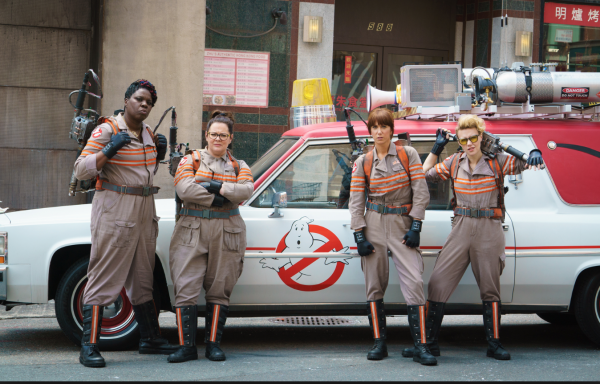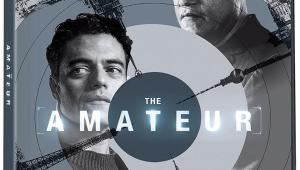What Ghostbusters says About Hollywood and Us as an Audience

Over the last few weeks, there’s been intense discussion around the remake/re-imagining of the Ghostbusters franchise starring Melissa McCarthy, Kristin Wiig, Kate McKinnon, and Leslie Jones. The scrutiny started immediately upon the release of the trailer, and has surged well beyond opening weekend. Oddly enough, almost none of the conversation is focused on the quality of the actual film itself. What is it about this movie that has created so much hullabaloo?
Part One: Women and Hollywood
Women are terribly underrepresented in films. According to The Gina Davis Institute on Gender and Media, female roles are outnumbered by male roles 3 to 1 in media, and often they are portrayed as non-character physical eye-candy. In fact, women are three times as likely to be shown wearing intentionally sexy attire or partially nude in a film than a man. And that’s just in family films! Once you get above a PG-13 rating, the divide becomes even more noticeable. Only 18% of films have women as two of the top three speaking parts. Of the 100 highest grossing global films of all time, only eight had a sole female protagonist. Half of those are the Hunger Games movies. Considering women make up half of the world’s population, that balance is considerably off. So when you reflect on Ghostbusters, a summer blockbuster comedy helmed by not one, but four women, one of whom is black, and none of whom are scantily clad or chasing after a man in the trailer, suddenly you understand the immense pressure placed on what, on the surface anyway, should be a fun July flick. This is a movie that is defying convention, shattering the bare-minimum standard that is the Bechdel Test, and attempting to do so under the shadow of a franchise. In a recent discussion with Entertainment Weekly, Melissa McCarthy was asked about the scrutiny surrounding Ghostbusters and quipped, “If this doesn’t work, we go back and lose our vote... I’m talking pre-suffragette.” She’s joking, of course, but the fact remains that the rarity of women tentpole movies means that each becomes subject to proving not just themselves and their merits as a film, but a proof of concept that women can helm major movies beyond Katniss and Rey. Part Two:Hollywood and Race
If women in a leading role are rare, women of color in the opening credits are a goddamn unicorn. As such, every action and attribute of Leslie Jones’ character was called into question. Why isn’t she one of the scientists? If we could flip the gender of the Ghostbusters’ team, why not the race? Can we ever get beyond the “Sassy Black Best Friend” trope? Seeing a person of color on screen is a rare enough event, and, possibly because Leslie Jones in real life has a strong, no-nonsense personality, fans were hoping to see her portray a woman with more than a few taglines, but rather a full character with agency. Criticism started with the first trailer, months before the release, and created such a firestorm that the second trailer actually took on some of the internet ire. Again, is it fair to place the weight of years of under-representation and stereotyping at one person’s feet? Of course not. But when so few opportunities are afforded a community within the Hollywood structure, the situational gravity presses mightily on whomever manages to break through. In this case, the burden falls on Leslie Jones. Which leads us to… Part Three: Trolls Will be Trolls, Especially in an Election Cycle
You may have heard about Twitter banning an so-called tech writer for verbally abusing and harassing Leslie Jones, so much so that she eventually stepped away from the social media platform. (She has since returned after an outpouring of support.) I’m not going to discuss the media-addict in question here, as like Beetlejuice, he thrives on hearing his own name. Suffice it to say, he is the consummate troll; one of many such sociopathic persons who equates vitriol with attention, and attention with power. These kinds of people will do anything and say anything that gets them eyes and ears pointed in their direction, no matter how hurtful, hateful, hyperbolic, or false. Personally, I find them to be the most boring of humans, since they never say anything that will truly surprise you. That aside, if you’re out of the loop and curious, writer Laurie Penny posted her own analysis of the situation on Medium, and tackles the topic of this individual far better than I can.
Women are terribly underrepresented in films. According to The Gina Davis Institute on Gender and Media, female roles are outnumbered by male roles 3 to 1 in media, and often they are portrayed as non-character physical eye-candy. In fact, women are three times as likely to be shown wearing intentionally sexy attire or partially nude in a film than a man. And that’s just in family films! Once you get above a PG-13 rating, the divide becomes even more noticeable. Only 18% of films have women as two of the top three speaking parts. Of the 100 highest grossing global films of all time, only eight had a sole female protagonist. Half of those are the Hunger Games movies. Considering women make up half of the world’s population, that balance is considerably off. So when you reflect on Ghostbusters, a summer blockbuster comedy helmed by not one, but four women, one of whom is black, and none of whom are scantily clad or chasing after a man in the trailer, suddenly you understand the immense pressure placed on what, on the surface anyway, should be a fun July flick. This is a movie that is defying convention, shattering the bare-minimum standard that is the Bechdel Test, and attempting to do so under the shadow of a franchise. In a recent discussion with Entertainment Weekly, Melissa McCarthy was asked about the scrutiny surrounding Ghostbusters and quipped, “If this doesn’t work, we go back and lose our vote... I’m talking pre-suffragette.” She’s joking, of course, but the fact remains that the rarity of women tentpole movies means that each becomes subject to proving not just themselves and their merits as a film, but a proof of concept that women can helm major movies beyond Katniss and Rey. Part Two:Hollywood and Race
If women in a leading role are rare, women of color in the opening credits are a goddamn unicorn. As such, every action and attribute of Leslie Jones’ character was called into question. Why isn’t she one of the scientists? If we could flip the gender of the Ghostbusters’ team, why not the race? Can we ever get beyond the “Sassy Black Best Friend” trope? Seeing a person of color on screen is a rare enough event, and, possibly because Leslie Jones in real life has a strong, no-nonsense personality, fans were hoping to see her portray a woman with more than a few taglines, but rather a full character with agency. Criticism started with the first trailer, months before the release, and created such a firestorm that the second trailer actually took on some of the internet ire. Again, is it fair to place the weight of years of under-representation and stereotyping at one person’s feet? Of course not. But when so few opportunities are afforded a community within the Hollywood structure, the situational gravity presses mightily on whomever manages to break through. In this case, the burden falls on Leslie Jones. Which leads us to… Part Three: Trolls Will be Trolls, Especially in an Election Cycle
You may have heard about Twitter banning an so-called tech writer for verbally abusing and harassing Leslie Jones, so much so that she eventually stepped away from the social media platform. (She has since returned after an outpouring of support.) I’m not going to discuss the media-addict in question here, as like Beetlejuice, he thrives on hearing his own name. Suffice it to say, he is the consummate troll; one of many such sociopathic persons who equates vitriol with attention, and attention with power. These kinds of people will do anything and say anything that gets them eyes and ears pointed in their direction, no matter how hurtful, hateful, hyperbolic, or false. Personally, I find them to be the most boring of humans, since they never say anything that will truly surprise you. That aside, if you’re out of the loop and curious, writer Laurie Penny posted her own analysis of the situation on Medium, and tackles the topic of this individual far better than I can.
While the individual behind the trolling is unimportant, what we can learn from the situation is valuable. As a film, Ghostbusters had the audacity to not only defy the status-quo, but also to turn the norms on their head. Male roles are replaced with women. Stereotypically feminine roles, like the “brainless eye candy”, is filled by a man (receptionist Kevin, played by Chris Hemsworth.) A black woman is given screen time, and isn’t spouting sassy-isms or playing a slave. The sort of individuals who prefer the whitewashed and male-dominated worldview will feel threatened. A cursory glance at any comments section regarding these issues will bear out this theory.
Put this version of Ghostbusters out any summer, and you’re bound to have some blowback from these small-but-noisy groups. But mix an election cycle filled with fear mongering that stirs up the sensibilities of hate groups, add a dash of un-moderated social media platforms, and a population already on edge due to world events, and … well, here we are. What’s are the lessons to be learned? It isn’t to ignore the trolls. Ignoring trolls as a population or to deny hate groups exist, isn’t a solution; any more than ignoring the existence of termites will save your house. While they may be small, they can still crawl around in the dark places and damage a foundation. The comments they make hurt because there are still issues to be solved, foundations that need rebuilding. Which brings me to the second lesson. We need more diversity in Hollywood. The only reason Ghostbusters has undergone this kind of examination is because the cast is “unusual.” If you don’t believe me, consider the fact that I haven’t even once in this discussion covered whether or not Ghostbusters is even a good movie. We can’t move on to emphasizing the script, or plot holes, or quality of visual effects until features like this are the norm rather than the exception. If we build the entertainment industry out of stories featuring humans of all genders and colors, the destructive commentary of the hateful internet troll will garner just as much attention as termites gnawing on a solid steel foundation. Get on it, Hollywood. I’ll even spring for the popcorn.





























































